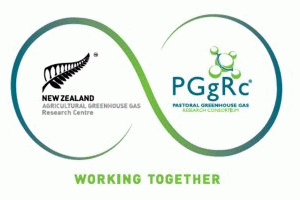
Content supplied by NZAGRC and PGgRc*
New Zealand scientists have identified animal-safe compounds that can reduce methane emissions from sheep & cattle by up to 90 per cent.
The announcement was made yesterday by Pastoral Greenhouse Gas Research Consortium (PGgRc) Chairman and New Zealand Agricultural Greenhouse Gas Research Centre (NZAGRC) Steering Group member Rick Pridmore.
This significant research progress comes as a result of substantially increased government and farmer funding into agricultural greenhouse gas mitigation over the past five years.
Results from animal trials were presented at the NZAGRC-PGgRc Greenhouse Gas Mitigation Conference in Palmerston North on Tuesday 28 April.
Dr Pridmore says the successful test of methane inhibitors is news that New Zealand farmers can get excited about.
“The results are significant for two reasons. First, because they work on livestock consuming a grass-based diet and, second because the short-term trials showed such dramatic results.
“It must be stressed that these are early days. Further trials are needed to confirm these compounds can reduce emissions in the long term, have no adverse effects on productivity and leave no residues in meat or milk.
“We are already looking to engage with a commercial partner and, all going well, we could possibly see a commercial product within five years.”
More than 100,000 compounds have been screened, and many thousands tested in laboratory experiments over the past several years. To date five compounds, selected as the most promising options, have been tested on sheep and resulted in reductions of methane emissions from 30% to more than 90%.
The research is funded by the jointly industry/government backed Pastoral Greenhouse Gas Research Consortium and the wholly Government-funded New Zealand Agricultural Greenhouse Gas Research Centre. Collaboration between New Zealand and international scientists, made possible through New Zealand Government funding in support of the Global Research Alliance on agricultural greenhouse gases, was critical for reaching this milestone.
The Ministry for Primary Industries’ International Policy Director and representative to the Global Research Alliance, Chris Carson, says “this is an exciting development and it is pleasing that funds made available by the New Zealand Government to support international cooperation in agricultural GHG research have played a role”.
Methane inhibitors are only one of several options that New Zealand scientists are pursuing to help reduce greenhouse gas emissions from agriculture says Dr Pridmore. Other approaches include breeding, developing a vaccine and specific feeds to reduce methane emissions, exploiting natural plant properties to reduce nitrous oxide emissions, and increasing the amount of carbon stored in pastoral soils.
“Breeding for reduced methane emission is progressing very well. We have shown that the trait is heritable and indications to date show no negative production impacts. The difference between high and low emitters currently is about six percent.
“This means sheep farmers should have access to breeding value information in about two years that allows them to select for animals with lower methane emissions than the average sheep.
“Work on cattle is only starting, but based on lessons we have learnt from sheep, we hope that cattle breeding values will follow within five years.
The Conference will cover latest developments in domestic and international climate change policy and prospects for reducing greenhouse gas emissions from agriculture. In addition to Dr Pridmore, speakers include New Zealand’s Climate Change Ambassador Jo Tyndall, and the Government’s Chief Science Advisor, Sir Peter Gluckman, along with a range of domestic and international experts on climate change and agriculture, including the Intergovernmental Panel on Climate Change.
----------------------------
NZAGRC is the New Zealand Agricultural Greenhouse Gas Research Centre, and PGgRc is the Pastoral Greenhouse Gas Research Consortium
We welcome your comments below. If you are not already registered, please register to comment
Remember we welcome robust, respectful and insightful debate. We don't welcome abusive or defamatory comments and will de-register those repeatedly making such comments. Our current comment policy is here.